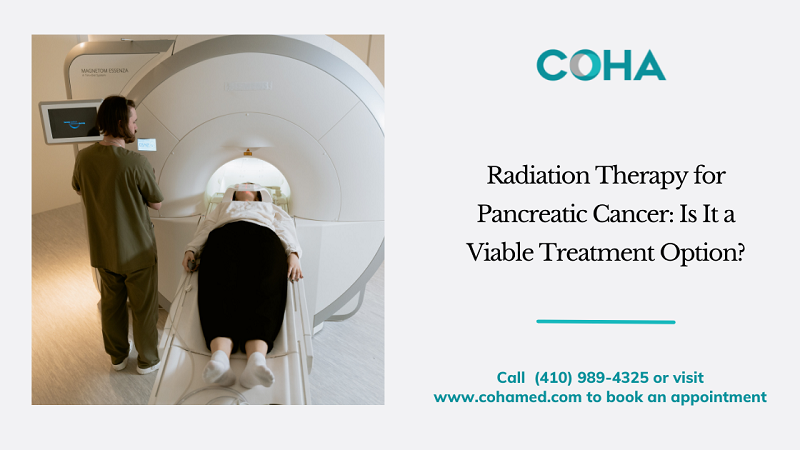Pancreatic cancer remains the 4th leading cause of cancer death in the US. The 5-year survival rate of this cancer, when diagnosed at an early stage, is 42%. However, compared to other cancers, pancreatic cancer does not produce early symptoms, and more than half of patients (52%) are often diagnosed after cancer has spread to distant organs, which decreases the survival rate to only 3%.
That’s why it’s important to begin treatment as soon as the cancer is diagnosed. Radiation therapy for pancreatic cancer remains an effective treatment option in all stages, as it helps to shrink the tumor, prevent cancer cells from growing, and kill cancer cells. Let us discuss when and how radiotherapy for pancreatic cancer is given.
What Is Pancreatic Cancer?
Pancreatic cancer occurs when cells in the pancreas (located deep in the abdomen behind the stomach) grow uncontrollably.
Types of pancreatic cancer include:
Exocrine (Non-endocrine) Pancreatic Cancer
Occurring in the pancreatic ducts and exocrine gland, it can lead to:
- Colloid Carcinoma – Develops from a benign cyst called an intraductal papillary mucinous tumor.
- Adenocarcinoma – Develops from the cells producing pancreatic enzymes and occurs in the duct lining.
- Adenosquamous Carcinoma – Similar to ductal adenocarcinoma and squamous cell carcinoma.
- Squamous Cell Carcinoma – Originating in the pancreatic ducts, it is made of squamous cells that are uncommon in the pancreas.
Neuroendocrine Pancreatic Cancer
It is a rare type that originates from cells in the pancreatic endocrine gland.
Symptoms of Pancreatic Cancer
Symptoms will usually appear as cancer progresses, which are:
- Jaundice
- Abdominal pain radiating to your back
- Itchy skin
- Fatigue
- New diagnosis of diabetes or existing diabetes becoming difficult to control
- Blood clots
- Loss of appetite
- Unexplained weight loss
- Light-colored stools and dark-colored urine
When and Why Is Radiation Therapy Used for Pancreatic Cancer?
Oncologists may recommend radiation therapy for pancreatic cancer in the following situations:
- Before Surgery (Neoadjuvant) – To shrink the tumor, making it easier to remove and reduce the chance of cancer recurring.
- After Surgery (Adjuvant) – To kill any remaining cancer cells (if left behind during surgery) and prevent cancer from coming back.
- With Chemotherapy – Radiation therapy can be combined with chemotherapy to treat cancers that have grown beyond the pancreas and cannot be removed by surgery.
- Relieve Symptoms – Radiation therapy may be given to patients with advanced tumors to relieve pain and control bleeding (if the tumor involves the stomach and bowel).
Research studies have shown that the pancreatic cancer radiation therapy success rate is similar to that of surgeries. Depending on the type of radiation used, the two-year overall survival (OS) rate varies from 20% to 50% of patients.
Types of Radiation Therapy
Radiation therapy uses high-energy X-ray beams to destroy cancer cells. Its types include:
- External Beam Therapy (Commonly Used Type) – Delivers X-ray beams to tumors to destroy them.
- Intensity-Modulated Radiation Therapy – Delivers focused radiation to the tumor by changing radiation beam strength under computer control.
- Stereotactic Body Radiation Therapy – Delivers focused high doses of radiation to treat the tumor and the surrounding area.
- Internal Radiation Therapy – Delivers radiation via radioactive material inserted in or near cancer.
- Proton Beam Therapy – Delivers protons (instead of X-rays) to destroy cancer cells.
How Is Radiation Therapy Administered?
It can be five days a week for several weeks. Each radiation session can last for 15 to 20 minutes, and patients will be given oral chemotherapy drugs on the treatment days to improve radiation therapy’s efficiency. Your provider will determine how frequent the treatment is.
Side Effects of Radiation Therapy
Common side effects of radiation therapy include:
- Nausea and vomiting
- Skin changes
- Loss of appetite
- Weight loss
- Diarrhea
- Fatigue
Generally, these side effects will subside within a few weeks after the treatment is done.
Contact COHA for Customized Pancreatic Cancer Treatment
Whether you are looking for a pancreatic cancer diagnosis, treatment, or guidance for managing your condition, schedule an appointment with us today at Chesapeake Oncology Hematology Associates. Our leading oncologists will provide you with the best-in-class pancreatic cancer treatment with desired results.



Share Your Valuable Thought